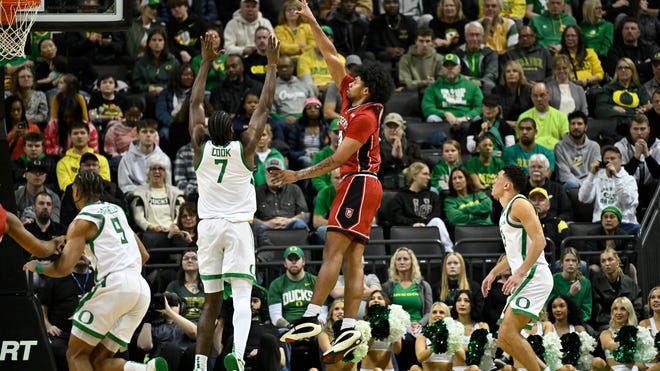Last month, after his UCLA basketball team won at Washington in a game that tipped at 8:15 p.m. Pacific Time, head coach Mick Cronin blurted out an angry truth.
“We should have just had this game at midnight,” he told reporters. “When you sell your soul to television, that’s just the way it is. That’s college sports. We’ve sold our soul to television.”
No league has sold out harder than the Big Ten, which bloated itself to 18 teams and a coast-to-coast footprint, chasing media-rights dollars like a dog drooling over a chew toy. The latest fallout comes Wednesday, when Rutgers basketball completes a two-game West Coast swing at Washington, tipping at the asinine time of 10:30 p.m. Eastern.
To review: The Scarlet Knights took a six-hour flight to Oregon Friday, got throttled by the Ducks Sunday night, then boarded a bus for a five-hour late-night ride north to Seattle. After Wednesday’s game they will immediately fly home, arriving in Piscataway mid-morning Thursday.

That’s 6,000 miles and six days for two regular-season matchups devoid of any history, backstory or juice.
Need a break? Play the USA TODAY Daily Crossword Puzzle.
To be clear: Every team in the league endures a version of this ridiculousness, although it’s more acute for the programs on the coasts. And the travel is not an excuse for Rutgers’ poor play at Oregon, which seemed like a continuation of last week’s listless finish against Iowa at home.
But the men’s basketball program’s first Big Ten West Coast trip is an occasion to review just how dumb this whole setup is. The team is going to log 21,700 travel miles during this regular season, easily the most in program history and likely the most by any Rutgers sports team ever.
St. John’s coach Rick Pitino has it right: These TV-driven conference alignments should be confined to football, with all the other sports in traditional regional leagues. The travel demands for football – a handful of trips a year, all on weekends – are much lower. And football is enough of an economic engine that the cash would remain flowing for these schools if it stood alone.

Decoupling football from the other sports is not splitting the atom. But it would reduce TV programming, which is why Cronin says college basketball has “our soul to television.”
So instead – all so TV audiences can be pitched products during timeouts – the Rutgers soccer, baseball, softball and tennis teams are forced to fly to the West Coast for contests with no tangible benefits. At least those games take place on weekends. Even Rutgers women’s basketball’s trip west later this week does not include anything like a Wednesday 10:30 start.
You can say “too bad, college athletes are pros now,” but only a fraction of those being dragged all over the country in the middle of a semester are making full-time money, while the vast majority are working toward a degree that they will need when they don’t sniff the pro sports ranks.

And if that argument doesn’t appeal to you, consider the interesting point Maryland coach Kevin Willard made a couple of years back about the Big Ten’s obsession with late tip-offs and Sunday night games grinding players into the ground: “There’s a reason why they haven’t won a championship since 2000.”
It’s worse than ever now, and it didn’t have to happen like this. The Big Ten could be plenty rich without Rutgers playing in Seattle at 10:30 on a Wednesday in February. Instead the conference is a bloated sellout that underachieves each March.
One might even call that justice.
Jerry Carino has covered the New Jersey sports scene since 1996 and the college basketball beat since 2003. Contact him at jcarino@gannettnj.com.
This post was originally published on this site be sure to check out more of their content.










